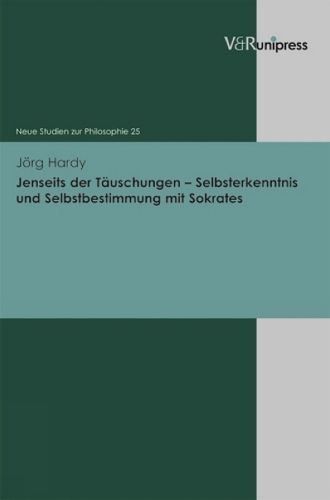Readings Newsletter
Become a Readings Member to make your shopping experience even easier.
Sign in or sign up for free!
You’re not far away from qualifying for FREE standard shipping within Australia
You’ve qualified for FREE standard shipping within Australia
The cart is loading…






English summary: This book is both a study about the Socratic-Platonic conception of a good life, and an analytical study on self-knowledge, self-determination, and moral motivation. In the first part of his book, the author provides a detailed analysis of arguments of the Apology, Protagoras, Laches, Meno, Gorgias, Charmides, Republic, and Phaedo. For Socrates, the life we ought to live is the good life (or happiness, eudaimonia), the life we want to live - once we know what it means to live a good life. The good life requires the knowledge about human well-being, which is to be acquired by way of questioning ourselves and examining our and others’ beliefs. An agent who possesses this knowledge pursues three general, supreme goals: she wants to know the particular action, which isuall-things-considereduin a present situation the best means to her happiness, she wants to act on her knowledge, and she does not want to harm other people. Hardy defends a non-reductive reading of Socratic intellectualism: The knowledge about human well-being is a comprehensive both theoretical, and practical knowledge, which encompasses all the relevant mental capacities and abilities of a person. In the second part of the book, the author presents a theory of self-knowledge, self-determination, and moral motivation on the basis of his interpretation of the Socratic conception of virtue. German text. German description: Wie ware es, ein nachdenkliches und gedanklich selbst-bestimmtes Leben zu fuhren - ein Leben, das von einem moglichst genauen und moglichst tauschungsresistenten Wissen uber die eigene Person bestimmt ist[unk] Diese Frage wird in dieser Studie im Blick auf die Platonische Philosophie sowie im Blick auf zeitgenossische, systematische Fragen erortert. Wenn wir ein gelingendes Leben fuhren wollen, sollten wir Sokrates zufolge drei allgemeine, vorrangige, modale Ziele verfolgen: das Verfugen uber Wissen bzw. gerechtfertigte Meinungen, das von Wissen bestimmte Wollen und das moralische Wollen. Um diese Ziele erreichen zu konnen, brauchen wir ein komplexes handlungsleitendes Wissen uber das gelingende Leben. Der Autor nennt es das eudamonistische Wissen. In dem ersten Hauptteil der Studie wird das eudamonistische Wissen erlautert. Interpretiert werden Argumente aus Apologie, Protagoras, Laches, Menon, Gorgias, Charmides, Politeia und Phaidon. Zwei wesentliche Elemente eines gelingenden Lebens sind Selbsterkenntnis und gedankliche Selbstbestimmung. In dem zweiten Hauptteil der Studie wird der Versuch einer systematischen Interpretation der sokratischen Konzeption unternommen: Wie haben wir uns den menschlichen Geist vorzustellen, um den Zusammenhang zwischen Selbst-erkenntnis und gedanklicher Selbstbestimmung zu verstehen[unk] Welchen Beitrag leisten Selbsterkenntnis und Selbstbestimmung zur moralischen Einstellung[unk]
$9.00 standard shipping within Australia
FREE standard shipping within Australia for orders over $100.00
Express & International shipping calculated at checkout
English summary: This book is both a study about the Socratic-Platonic conception of a good life, and an analytical study on self-knowledge, self-determination, and moral motivation. In the first part of his book, the author provides a detailed analysis of arguments of the Apology, Protagoras, Laches, Meno, Gorgias, Charmides, Republic, and Phaedo. For Socrates, the life we ought to live is the good life (or happiness, eudaimonia), the life we want to live - once we know what it means to live a good life. The good life requires the knowledge about human well-being, which is to be acquired by way of questioning ourselves and examining our and others’ beliefs. An agent who possesses this knowledge pursues three general, supreme goals: she wants to know the particular action, which isuall-things-considereduin a present situation the best means to her happiness, she wants to act on her knowledge, and she does not want to harm other people. Hardy defends a non-reductive reading of Socratic intellectualism: The knowledge about human well-being is a comprehensive both theoretical, and practical knowledge, which encompasses all the relevant mental capacities and abilities of a person. In the second part of the book, the author presents a theory of self-knowledge, self-determination, and moral motivation on the basis of his interpretation of the Socratic conception of virtue. German text. German description: Wie ware es, ein nachdenkliches und gedanklich selbst-bestimmtes Leben zu fuhren - ein Leben, das von einem moglichst genauen und moglichst tauschungsresistenten Wissen uber die eigene Person bestimmt ist[unk] Diese Frage wird in dieser Studie im Blick auf die Platonische Philosophie sowie im Blick auf zeitgenossische, systematische Fragen erortert. Wenn wir ein gelingendes Leben fuhren wollen, sollten wir Sokrates zufolge drei allgemeine, vorrangige, modale Ziele verfolgen: das Verfugen uber Wissen bzw. gerechtfertigte Meinungen, das von Wissen bestimmte Wollen und das moralische Wollen. Um diese Ziele erreichen zu konnen, brauchen wir ein komplexes handlungsleitendes Wissen uber das gelingende Leben. Der Autor nennt es das eudamonistische Wissen. In dem ersten Hauptteil der Studie wird das eudamonistische Wissen erlautert. Interpretiert werden Argumente aus Apologie, Protagoras, Laches, Menon, Gorgias, Charmides, Politeia und Phaidon. Zwei wesentliche Elemente eines gelingenden Lebens sind Selbsterkenntnis und gedankliche Selbstbestimmung. In dem zweiten Hauptteil der Studie wird der Versuch einer systematischen Interpretation der sokratischen Konzeption unternommen: Wie haben wir uns den menschlichen Geist vorzustellen, um den Zusammenhang zwischen Selbst-erkenntnis und gedanklicher Selbstbestimmung zu verstehen[unk] Welchen Beitrag leisten Selbsterkenntnis und Selbstbestimmung zur moralischen Einstellung[unk]